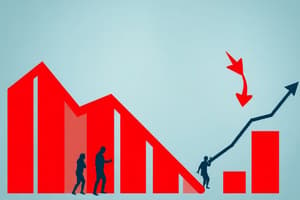Podcast
Questions and Answers
During which phase of the business cycle is economic activity at its maximum level?
During which phase of the business cycle is economic activity at its maximum level?
- Peak (correct)
- Expansion
- Trough
- Contraction
What is a contraction also referred to as?
What is a contraction also referred to as?
- Peak
- Trough
- Contraction (correct)
- Expansion
Which factor can influence business cycles by altering production processes and consumer preferences?
Which factor can influence business cycles by altering production processes and consumer preferences?
- Monetary policy
- Consumer and business sentiment
- Fiscal policy
- Technological advancements (correct)
What can businesses focus on during the expansion phase of the business cycle?
What can businesses focus on during the expansion phase of the business cycle?
What should businesses do during the contraction phase of the business cycle?
What should businesses do during the contraction phase of the business cycle?
What can businesses consider during the peak phase of the business cycle?
What can businesses consider during the peak phase of the business cycle?
Which of the following best describes macroeconomics?
Which of the following best describes macroeconomics?
What is GDP?
What is GDP?
Why is GDP significant?
Why is GDP significant?
What does GDP per capita measure?
What does GDP per capita measure?
Why do governments and central banks use GDP data?
Why do governments and central banks use GDP data?
What role does GDP growth rate play in investment decisions?
What role does GDP growth rate play in investment decisions?
Which of the following is a key objective of fiscal policy?
Which of the following is a key objective of fiscal policy?
What is the main focus of monetary policy?
What is the main focus of monetary policy?
When are expansionary fiscal and monetary policies typically used?
When are expansionary fiscal and monetary policies typically used?
What does contractionary fiscal policy aim to achieve?
What does contractionary fiscal policy aim to achieve?
What are the benefits of international trade?
What are the benefits of international trade?
What factors influence exchange rates?
What factors influence exchange rates?
Which of the following is a type of unemployment caused by shifts in the structure of an economy?
Which of the following is a type of unemployment caused by shifts in the structure of an economy?
What is the most common measure of unemployment?
What is the most common measure of unemployment?
Which type of inflation is caused by supply shocks, such as increases in the cost of raw materials or labor?
Which type of inflation is caused by supply shocks, such as increases in the cost of raw materials or labor?
What are the two key economic tools used to manage and regulate economic activities?
What are the two key economic tools used to manage and regulate economic activities?
What is the theoretical relationship between inflation and unemployment in an economy called?
What is the theoretical relationship between inflation and unemployment in an economy called?
What impact can unemployment have on the economy?
What impact can unemployment have on the economy?
Which method is most commonly used to calculate GDP?
Which method is most commonly used to calculate GDP?
What does GDP growth rate measure?
What does GDP growth rate measure?
What does a negative GDP growth rate indicate?
What does a negative GDP growth rate indicate?
What are some limitations of GDP as a measure of economic health?
What are some limitations of GDP as a measure of economic health?
What is the business cycle?
What is the business cycle?
Why is understanding the business cycle important?
Why is understanding the business cycle important?
Which of the following is NOT a key objective of fiscal policy?
Which of the following is NOT a key objective of fiscal policy?
What is the main focus of monetary policy?
What is the main focus of monetary policy?
Which of the following is NOT a benefit of international trade?
Which of the following is NOT a benefit of international trade?
What can trade imbalances result in?
What can trade imbalances result in?
What factors influence exchange rates?
What factors influence exchange rates?
Which of the following factors can affect the supply of goods and services?
Which of the following factors can affect the supply of goods and services?
Which of the following factors can affect the demand for goods and services?
Which of the following factors can affect the demand for goods and services?
Which of the following statements is true about equilibrium price and quantity?
Which of the following statements is true about equilibrium price and quantity?
What does price elasticity of demand measure?
What does price elasticity of demand measure?
Which of the following best describes microeconomics?
Which of the following best describes microeconomics?
What is the law of supply and demand?
What is the law of supply and demand?
What is the main focus of microeconomic analysis?
What is the main focus of microeconomic analysis?
What does price elasticity of demand measure?
What does price elasticity of demand measure?
Which of the following market structures is characterized by a large number of small, homogeneous firms with no market power?
Which of the following market structures is characterized by a large number of small, homogeneous firms with no market power?
What factor affects price elasticity of demand by considering the proportion of income spent on a good or service?
What factor affects price elasticity of demand by considering the proportion of income spent on a good or service?
Which market structure is characterized by a single firm dominating a market with no close substitute?
Which market structure is characterized by a single firm dominating a market with no close substitute?
What market structure is characterized by a small number of interdependent firms dominating the market?
What market structure is characterized by a small number of interdependent firms dominating the market?
Which of the following is a key cost concept in understanding production and cost functions?
Which of the following is a key cost concept in understanding production and cost functions?
What does the production function describe?
What does the production function describe?
In which market structure do firms have the ability to set prices based on their market power?
In which market structure do firms have the ability to set prices based on their market power?
What happens to average variable costs (AVC) as production increases in the short run?
What happens to average variable costs (AVC) as production increases in the short run?
Which of the following statements accurately describes long-run costs?
Which of the following statements accurately describes long-run costs?
What does the long-run average cost (LRAC) illustrate?
What does the long-run average cost (LRAC) illustrate?
What are economies of scale?
What are economies of scale?
How can technological advancements impact production costs?
How can technological advancements impact production costs?
Flashcards are hidden until you start studying
Study Notes
Business Cycle Phases
- Economic activity peaks during the expansion phase, marking the maximum level of economic output.
- A contraction is also known as a recession, indicating a decline in economic activity.
- Technological advancements can influence business cycles by changing production methods and consumer preferences.
- During the expansion phase, businesses should focus on increasing production and acquiring new customers.
- In the contraction phase, it is advisable for businesses to reduce costs and possibly downsize to maintain profitability.
- At the peak phase, businesses should consider strategic planning for potential market adjustments and downturns.
Macroeconomics and GDP
- Macroeconomics studies the economy as a whole, focusing on large-scale economic factors.
- Gross Domestic Product (GDP) represents the total monetary value of all finished goods and services produced within a country.
- GDP is significant as it serves as a primary indicator of a nation's economic health and growth potential.
- GDP per capita measures the average economic output per person, providing insights into living standards.
- Governments and central banks utilize GDP data to formulate economic policies and assess economic performance.
- The GDP growth rate influences investment decisions, as positive growth indicates a healthier economy and investment opportunities.
Fiscal and Monetary Policy
- A key objective of fiscal policy is to manage economic stability and growth through government spending and taxation.
- Monetary policy primarily focuses on controlling the money supply and interest rates to influence economic activity.
- Expansionary fiscal and monetary policies are typically employed during economic downturns to stimulate growth.
- Contractionary fiscal policy aims to reduce inflation and stabilize the economy by decreasing spending or increasing taxes.
International Trade and Currency Exchange
- International trade brings benefits such as access to a broader market, specialization, and economies of scale.
- Factors influencing exchange rates include inflation, interest rates, economic stability, and political conditions.
- Structural unemployment arises from changes in the economy's structure, such as technological advancements or shifts in consumer demand.
- The most common measure of unemployment is the unemployment rate, representing the percentage of the labor force that is jobless.
Inflation and Economic Tools
- Cost-push inflation occurs when supply shocks, like rising raw material costs, cause price increases.
- Fiscal policy and monetary policy are the two key economic tools used to manage economic activity.
- The theoretical relationship between inflation and unemployment is referred to as the Phillips Curve.
- High unemployment can lead to reduced consumer spending, negatively impacting overall economic growth.
GDP Calculation and Limitations
- The expenditure approach is the most common method to calculate GDP, summing total spending on goods and services.
- The GDP growth rate measures how fast a country's economy is expanding or contracting over time.
- A negative GDP growth rate indicates an economic contraction and potential recession.
- Limitations of GDP as an economic health measure include its inability to account for income distribution, non-market transactions, and environmental factors.
Understanding the Business Cycle
- The business cycle describes the fluctuations in economic activity over time, consisting of expansion, peak, contraction, and trough phases.
- Understanding the business cycle is crucial for businesses and policymakers to make informed strategic decisions.
Supply and Demand Dynamics
- Trade imbalances can lead to economic instability, affecting currency value and economic relationships between countries.
- Factors that influence supply include production costs, technology, and the number of suppliers in the market.
- Demand for goods and services can be affected by consumer preferences, income levels, and prices of related goods.
- Equilibrium price and quantity occur when the quantity supplied equals the quantity demanded in a market.
Price Elasticity and Market Structures
- Price elasticity of demand measures how responsive consumers are to price changes; it considers the availability of substitutes and the proportion of income spent.
- Microeconomics analyzes individual consumer and firm behavior, focusing on market dynamics.
- The law of supply and demand states that prices are determined by the relationship between supply and demand in the market.
- Market structures vary from perfect competition (many firms) to monopoly (one firm) and oligopoly (few interdependent firms).
Production Costs and Economies of Scale
- A production function describes the relationship between inputs and the resulting output.
- Firms in oligopolistic and monopolistic structures can set prices to some extent based on market power.
- As production increases in the short run, average variable costs (AVC) may initially decrease due to efficiencies but can increase as capacity limits are reached.
- The long-run average cost (LRAC) curve illustrates the lowest cost per unit over different scales of production.
- Economies of scale occur when increased production leads to lower average costs.
- Technological advancements can significantly lower production costs by enhancing efficiency and reducing resource waste.
Studying That Suits You
Use AI to generate personalized quizzes and flashcards to suit your learning preferences.



